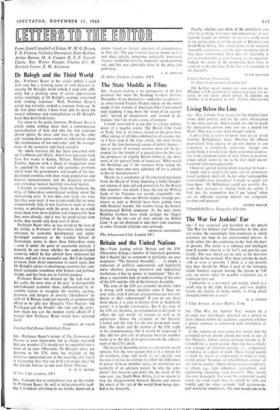Britain and the United Nations
Sm,—Your leading article 'Britain and the UN' (November 4) begs a number of important questions, but I should like to comment in particular on your statement : The General Assembly . . . is simply a collection of political opportunists and hopelessly naive idealists, passing extremist and impractical resolutions it has no power to implement.' This dis- plays a regrettable lack of understanding of the aims of the UN and the role of the General Assembly.
The aims of the UN are certainly idealistic; what is wrong with stating idealistic aims if these are your aims, even if present circumstances are not con- ducive to their achievement? If you do not share these ideals, it is easy to dismiss them as 'hopelessly naive'; it is hardly constructive. But if the aims of the UN are idealistic, its organisation is designed to reflect the real world—its stresses as well as its aspirations. Hence the existence of the Security Council and the veto for the five permanent mem- bers. The ideals and the realism of the UN ought to be complementary; but it would be surprising if they did not give rise to disputes between member states as to the rate of progress towards the achieve- ment of the UN's ideals.
The General Assembly exists as a forum for world opinion. For the very reason that it is a forum for all members, large and small, to use equally, and because it makes no attempt to reflect the differences in power between member states, its resolutions are normally of an advisory nature. So why the com- plaint? Just because you don't like the result of the vote over, say, South-West Africa, it is no reason to stop the disagreements between Britain and almost the whole of the rest of the world from being clari- fied in the Assembly. Finally, whether you think of the resolutions you refer to as being 'extremist and impractical,' or not, depends largely on whether or not you really want to see justice done to all the people of Rhodesia and South-West Africa. The actual terms of the General Assembly resolutions, and the near-unanimity which they have commanded, show that the Assembly is not as irresponsible as your leading article suggested. Indeed, the terms of the resolutions have been in contrast to the utterings of the few real extremists in the Assembly.
PE MR KELLNER
United Nations A svoriatiwt.
93 Albert Embankment. London SE!
[Mr Kellner neatly makes our own point for us. Whether a UN resolution is impractical does not de- pend on our views about justice. It depends on whether it is practical or not.—Editor, SPECTATOR.]






































 Previous page
Previous page